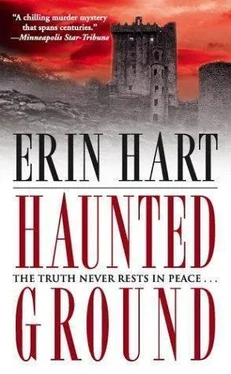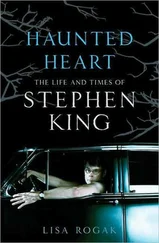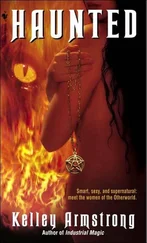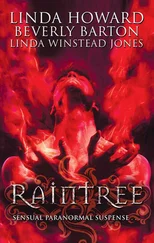As he drove to the postmortem in Ballinasloe, Devaney remembered how his prediction about inquisitive reporters had come true the previous afternoon. The first was an ambitious young man from the Sunday World who had to be escorted from the scene to keep him from crossing the barriers they’d set up near the road; next came the RTE camera crew. At least Devaney was spared dealing with them. As the superintendent in charge of the investigation, Brian Boylan was only too eager to be quoted in the papers and on the television news. Of course Boylan had nothing to say, apart from confirming what everyone already knew, that human remains had indeed been discovered at this site, and that it remained to be determined whether there was a connection between the discovery and the Osborne case or any other unsolved disappearances. He also didn’t tell them that the police had found a collapsible pushchair, a pair of small blue shoes, and Mina Osborne’s handbag, or that a .22 rifle had also been recovered from the souterrain. As he’d watched his superintendent bask in the television lights, Devaney had imagined the modesty with which Boylan would eventually take credit for shepherding the investigation to this juncture.
Once in Ballinasloe, he drove around the back of the hospital to the mortuary. He’d always dreaded postmortems, and the familiar queasiness started even before he’d parked the car. He got directions to the autopsy room, and found Malachy Drummond just outside the door. Drummond was a thinnish man, balding and bespectacled, known by colleagues for his trademark dickie bows and his appetite for good food and drink. His face had become familiar to the general public from coverage of crime scenes on the television news, but Drummond took this exactly for what it was, a kind of spurious quasi-celebrity that had nothing whatever to do with his actual work. To his colleagues in the police, what Drummond did bordered on the repellent, but the man himself had earned their respect for a professional demeanor and methodical work habits tempered by consideration for the dead. He always referred to his charges as “the lady” or “the gentleman,” despite the often undignified circumstances of their deaths.
“Detective” was his laconic greeting to Devaney. “Sad business, this, a young mother and child. Very sad.” Devaney had enough experience of the man to know he actually meant it. “I have a few things I want to show you.” Drummond led the way into the autopsy room, where Devaney was relieved to see that the bodies had been covered.
“With dental records we were able to confirm the identity of the young lady—she is Mina Osborne, without a doubt. And the cause of death seems fairly clear.” Malachy Drummond picked up long tweezers from a metal tray, and held up for Devaney’s inspection a slightly misshapen rifle pellet. “I found this inside the braincase. But there was neither entrance or exit injury to the skull itself, which tells me a couple of things: one, that she was not shot at close range—which would rule out a self-inflicted wound—and two, that the bullet probably entered the body through soft tissue: the eye, for example, or perhaps the mouth. Difficult to tell with such an advanced state of decomposition.”
“And the child?” Devaney asked.
“With the remains almost completely skeletized, it’s hard to say. No apparent knife or bullet wounds, no blunt injury. The only evidence of trauma is a hairline skull fracture, but that doesn’t appear severe enough to have been the cause of death on its own. However, as I said yesterday, the position of the bodies certainly suggests that they were moved to the location where they were found. I’m ruling both as homicides.” Drummond must have heard the small sigh that escaped Devaney’s lips. He added, gently, “From the nature of his injury, I’d venture to say the little lad was probably unconscious, Detective, whatever ultimately happened to him.”
Devaney himself wasn’t sure why the information about Christopher Osborne triggered such an emotional response. He had worked on scores of murders, and had always been able to maintain his objectivity. Lack of sleep, it must be. He straightened. “Thanks, Malachy. I’ll look for your report.”
As he walked down the corridor from the mortuary to the main hospital building, Devaney tried to work out a scenario in which the different causes of death would make sense. He’d had no preconceptions about what might have happened; why did these facts, taken together, seem so strange? Even after the bodies were discovered, he had wondered about the possibility of a murder/suicide. Such things were not unheard of. But Malachy had found that Mina Osborne’s injuries were definitely not self-inflicted. They’d have to get a ballistics test to find out whether the gun found in the souterrain was the same one that fired the fatal bullet. So how did Jeremy know where the bodies were, unless he was somehow involved? The boy didn’t seem like the type to plan and commit two murders all on his own. Maybe he had witnessed something. Devaney’s head began to ache from the smell of antiseptic, and from the thoughts that kept tumbling against one another in his brain. Christ, he’d give anything for a cigarette.
He turned down the corridor that would take him past Jeremy Osborne’s room, where he pulled aside a passing nurse.
“Any news on the Osborne lad?”
“Sorry, there’s been no change.”
Through the large window, he could see that Lucy Osborne still kept her vigil. She hadn’t been home since Jeremy had been brought here, but sat silently beside her son. In all the times he’d been to check on the boy, Devaney had never seen her sleeping, and yet she somehow managed to maintain her usual fastidious appearance, despite having to wash in the public lavatory down the corridor. He had not divulged to anyone, even his own colleagues in the Gardai, where the break in the case had come from, but with the burgeoning media attention, there was no way Lucy Osborne could have missed hearing about the recovery of the bodies. No doubt she was trying to block it from her mind, concentrating fiercely on her son.
The day after the scene-of-crime officers had finished and packed off back to Dublin, all that remained was the flimsy barrier of yellow tape staked around the perimeter, wrapped around saplings in the now torn-up woodland at Bracklyn House. Cormac had come back out here looking for Nora; there was no sign of her in the house, and he wanted to let her know he was going to work on the excavation site. He stepped up to the edge of the souterrain, thinking that this secret place, this nest of concealment, had ultimately succeeded too well in its purpose.
Nora was sitting with her knees drawn up to her chest and her back up against the wall of the souterrain. A torch lay just out of reach beside her on the clean-swept dirt floor. She didn’t look up. “I had to see it for myself,” she said.
Cormac eased himself down into the souterrain and sat down a couple of feet from her. Nora’s right hand held a jagged piece of stone, and for an instant she seemed unsure what to do with it. Instead of flinging it, as he had thought she might, she began to scrape at the dirt floor beside her, almost unaware of what she was doing.
“I’ve been sitting up there for days, watching all this, thinking about Mina Osborne,” she said. “I wonder if she even knew she was in danger.”
Cormac said nothing, only watched Nora’s hand scrub a shallow trough in the earth with the stone. She finally spoke: “The night she was killed, I thought my sister would be safe with me. I thought I’d finally succeeded in convincing her that the way Peter treated her wasn’t right. That she didn’t deserve it. Elizabeth was away for the weekend with my parents. Triona called to tell me she had packed a bag, everything was set, and she was finally walking out. She was going to be all right; she and Elizabeth were going to stay with me as long as they needed to. But do you know what else she told me just before she hung up the phone? That underneath it all, even though she couldn’t live like that anymore, that a part of her still loved him. I think she tried to tell Peter what she’d told me, and he finally snapped. Nobody can prove it, but I know, I know that’s what happened. He couldn’t keep her, so he made sure she would never be her own, separate person, or anything more than his pathetic victim, forever.”
Читать дальше











